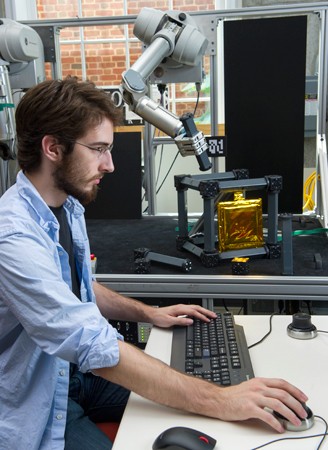In response to industry's growing need for engineers with the specialized skills to design and deploy advanced robotics systems, Johns Hopkins University's Whiting School of Engineering now offers a Master of Science in Engineering in Robotics degree program.

Image credit: Will Kirk / Johns Hopkins University
Anchored in the school's Laboratory for Computational Sensing and Robotics, considered one of nation's the top robotics research labs, the new multidisciplinary degree program is designed for top students from a variety of engineering, scientific, and mathematical backgrounds.
"The demand for engineers who have the kind of multidisciplinary knowledge and training needed to design and develop robotics systems is spiraling and is expected to continue growing," said Noah Cowan, deputy director for Johns Hopkins' robotics academic programs. "We're responding to that need."
Johns Hopkins' interdisciplinary approach, which brings together researchers from the schools of Engineering, Arts and Sciences, and Medicine, as well as the Applied Physics Laboratory, makes it uniquely qualified to offer a truly comprehensive program that allows students to specialized in one or more of the following tracks: medical robotics and computer integrated surgical systems; perception and cognitive systems; and automation science and engineering.
"Students have great flexibility even within the designated tracks to develop a largely customized program, based on their own interests and career goals," said Cowan, an associate professor of mechanical engineering who is also director of the Locomotion in Mechanical and Biological Systems laboratory.
The program boasts a faculty that includes two department chairs and several of the country's leading roboticists, including:
- Greg Chirikjian, professor of mechanical engineering, who is at the forefront of robot system modeling, having written several books in the field;
- Noah Cowan, associate professor of mechanical engineering, whose research examines sensing, dynamics, and control in robots and animals;
- Ralph Etienne-Cummings, professor of electrical engineering, who is a pioneer in neuromorphic engineering and bio-robotics;
- Gregory Hager, chair of the Department of Computer Science, who is on the forefront of research involving robot-human collaborative systems;
- Marin Kobilarov, assistant professor of mechanical engineering, who is is advancing the field of autonomous robotic systems;
- Nassir Navab, professor of computer science, who is a renowned expert in medical imaging and computer aided interventions;
- Russell Taylor, the John C. Malone Professor of Computer Science and director of the LCSR, who is one of the pioneers of the field of medical robotics; and
- Louis Whitcomb, chair of the Department of Mechanical Engineering, who made headlines recently when he and his students and collaborators deployed a robotic vehicle to explore the deepest place on earth, the Mariana Trench.
Posted in Science+Technology
Tagged mechanical engineering, robotics, engineering








